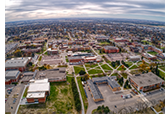Day 298, January 7, 2020
Building Things
Tonight's soundtrack: Duke Ellington's Big Four (with Joe Pass, Ray Brown, Louis Bellson) This is such a marvelously relaxed session. At one point it looks like they are finishing eating lunch. They are all having fun, especially Louis.
After being immersed in a busy day at work, I am wary to look at the news for fear of being sucked into whatever else has happened, and yet, it also feels eerily quiet... which I suppose is what might happen when you take the President off of social media. So, maybe the quiet is a good thing, it is certainly something we all need after the rollercoaster of the last few days.
 |
| Morning chickens with their treats. |
I was emailing with a colleague today about the value of constructing things at a time like this, how craft can be a solace to the woes and worries of the world, and I started thinking back to my days as a luthier. I started as an apprentice with Ivon Schmukler and eventually had a shop next door sandwiched between Brad Nickerson and Ivon and Bill Cumpiano. It was a formidable moment in Northampton luthier history, that little segment of Peter Payne's building.
I loved those days, the visceral messiness of resawing boards of 9" wide mahogany until every pore in my being was impregnated with dust. Walking through town I felt like Pig Pen from Peanuts. It was the kind of work where you focus on a task or a problem, and then you tackle it. Every process, every job was something with potential to refine and make better, easier, more consistent. We would sometimes joke that we spent as much time making jigs as we did making guitars.
The thing I remember most from trying to make a go at small production guitar building, where I was building three instruments at a time, was that the first part I was making... carving a bridge out of ebony, for example... was challenging and slow. I had to remember how I did it last time, find all the right skew knives, chisels, and vise mounts... but then the second one felt like carving butter. Everything went smoothly. The third one, was agonizing and painful, probably because I was tired, the tools dulled, or it was too close to lunch. But that second bridge, the second neck, the second rosette, that was a marvelous feeling.
At some point I would like to return to guitar building, not to make a living, but as a hobby, something that is done for the joy of making something. It would be such a different experience to not have that pressure of impending bills, rent due, and waiting customers. But, I am also wary of the toll guitar making takes on the body, the nimbleness of fingers, and the accumulated toxicity of tropical woods and finishes. My last few years I only used shellac dissolved in grain alcohol, which alleviated some of the concerns about lacquer fumes. I remember the liquor store owner looking me over warily as I brought up four or five bottles to the counter. At the time you couldn't buy grain alcohol in Massachusetts.
I think once life slows down, there will be space again for luthiery. My friend Brian tempts me with the idea of building a dream bass, and there are times when I imagine what that might look like.
It is funny, because for many years, building guitars ruined me for playing music. Every time I picked up a guitar in a store or was handed a guitar by a friend, I would instantly become aware of all the flaws, how mediocre it sounded, how the setup was detrimental to the sound or playability. I would notice how a factory had utilized beautiful woods and created an entirely generic instrument. Musical instrument factories are factories, and sometimes there are craftspeople working to the highest levels of perfection, and other times there are people who have found a job in a loud, smelly factory, where much of modern instrument building is done by machine and accompanied by constant roar of industrial dust collection.
I'm not sure when I recovered. At some point I started to find joy in playing again. I started to hear the voice of instruments again and my concern and discerning gaze faded into the background. It is a joyful thing to try and find an instrument's voice. Sometimes it is a funny, cardboard-like voice, but even that has its place and endearing qualities. That said, I still know what I like, and I know when something sounds right, and that is a marvelous thing to find.
I hope we can all spend our lives creating something, whether that is building a guitar, researching the properties of a protein, weaving a basket, raising children, writing the great novel, or playing piano like Duke Ellington. For, it is only through creation that we can overcome all the efforts to tear things down.
Take care and be well,
Leo
 |
| The Sawmill River |
From Our Friends:
From the REBLS Network:
Mentors Needed- Short Survey
Deadline: JAN. 20, 2021
Like working with students? The Industry Mentorship Program is looking for mentors. The goal of this program is to create an engaging partnership between underrepresented community college/university students interested in STEM and industry mentors to enable students to build bridges and to thrive. See more information on the program here. Questions: contact Rupal Trivedi.
If you are able to provide mentorship to one or more students please take a few minutes to fill out this survey.Pass the word and this survey link to people who may be interested in the rewarding experience of mentoring!
Like working with students? The Industry Mentorship Program is looking for mentors. The goal of this program is to create an engaging partnership between underrepresented community college/university students interested in STEM and industry mentors to enable students to build bridges and to thrive. See more information on the program here. Questions: contact Rupal Trivedi.
If you are able to provide mentorship to one or more students please take a few minutes to fill out this survey.
From HigherEd:
An Interview with Dr. Erica Moore
by Dr. Cobretti D. Williams

During Native American Heritage Month in November, Dr. Cobretti D. Williams spoke with Dr. Erica Moore, the director of the American Indian Student Center at South Dakota State University. Moore shares insight into the experiences of Native American students and the critical role the center plays in the advancement and retention of Native American history and culture in higher education.
Faculty satisfaction data reveal big gaps between how white and nonwhite professors experience campus diversity and inclusion efforts.
Faculty satisfaction data reveal big gaps between how white and nonwhite professors experience campus diversity and inclusion efforts.
From UMass Amherst:
Virtual - Finding the Way Forward through Racial Justice in Action
 |
| |
Issues of social justice and equality have made their way to the headlines this past year, due in large part to the summer’s Black Lives Matter protests and the ongoing health disparities brought to light by the pandemic. But these are not new issues, nor will they go away after they fade from the news.
UMass Amherst remains committed to addressing social justice issues and improving equity on and beyond campus.
In line with this commitment, join us for a virtual panel discussion with UMass faculty and alumni working to promote anti-racism and social justice.
Attendees will learn about:
- Anti-racism and social justice teaching and research at UMass
- Opportunities to access and leverage this body of work to affect change
- Barriers and challenges
- Student engagement and activism
Our panelists will also share personal accounts of why they are on the frontline of the social justice fight and provide a literary recommendation that has influenced them most.
All are invited and encouraged to submit questions for discussion upon registering; the panel will do their best to answer as many questions as possible in the time allotted.
From the American Council on Education:
Mental Health Task Forces in Higher Ed
Efforts to support greater well-being were increasing before the pandemic, and several campus leaders appointed mental health task forces. Read this ACE publication that analyzes and synthesizes 16 task force reports. It compiles ideas, operating procedures, and themes across recommendations to provide leadership with a guidebook to address mental health on their campuses, especially in light of COVID-19. |
[Workshop] Implementing What Works for Latino Students
Join this two-part Taking Action on Race and Ethnicity in Higher Education workshop to learn from experts how to intentionally implement and advance programs and policies that increase Latino student success. Workshop participants will examine evidence-based practices through a Latino lens to address key challenges and opportunities for a more equitable approach to student success. Learn more. |
From Teaching Tolerance:
From the It Gets Better Project:
One of our Youth Voices, Isabella Jimenez, is kicking off this week's blog with some words of encouragement for anyone who might be feeling scared or angry after yesterday's events. Those feelings are valid and OK and in her words... "It’s important that we’re able to press on and mature past this time, united together."
Watch Isabella's video here and enjoy the rest of Your Weekly Uplift!
 |
| Sometimes a grapefruit is just what one needs in a pandemic. |




Comments
Post a Comment